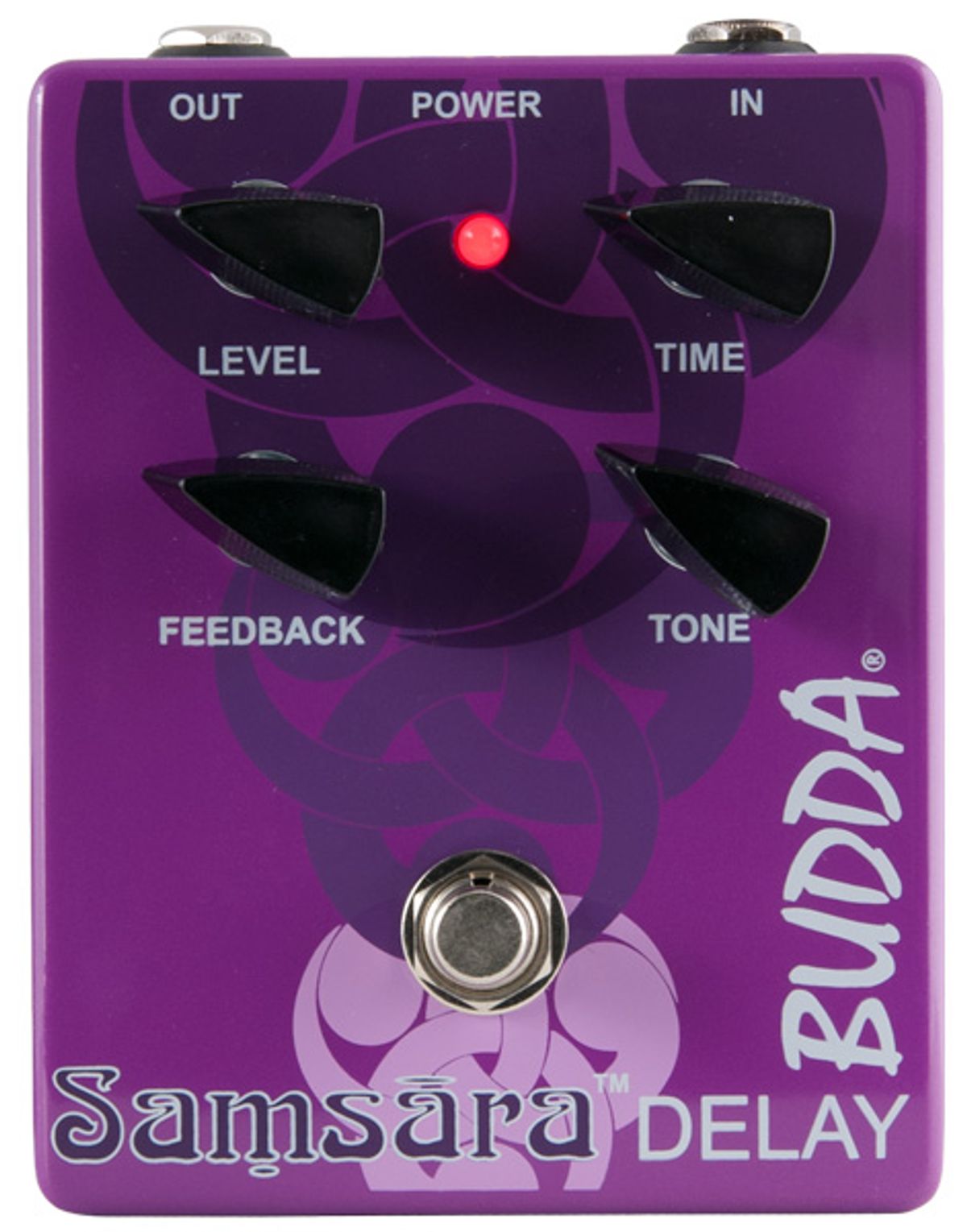A great sounding, no-frills delay, the Samsara makes a sturdy replacement for a vintage Memory Man or DM-2.
The first offering in Budda’s new boutique pedal lineup, the Samsara digital delay is designed to produce crisp digital repeats, warm analog-style echo, and everything in between. The pedal takes its name from the Buddhist belief in the repeating cycle of life—an appropriate moniker for an echo unit if ever there was one. It’s also distinguished by an intuitive control set, sturdy build, and a handy high-cut control for dialing in a huge range of satisfying delay tones.
Tone Reincarnated The Samsara’s sturdy steel enclosure provides plenty of protection against heavy wear and tear. It’s also fairly wide—more than twice the width of two MXR pedals side-by-side, which makes it less likely that you’d kick the controls accidentally when activating the true bypass switch. The Samsara is powered by either a 9V battery or a Boss-style 9V power adapter.
The pedal’s delay time ranges from 20 ms to 600 ms, running the gamut between rockabilly slapback and cavernous psychedelic echoes. Level, feedback, and time knobs respectively control repeat volume, number of repeats, and delay time, and the tone knob functions as a high-cut control for dialing in a tape-style warmth. Samsara also has the ability to self-oscillate by maxing out its feedback control, just like the classic analog delays of yore.
Simple Pleasures The Samsara’s straightforward and intuitive design is one of its strongest features. The simplicity makes it a forgiving pedal too. It’s genuinely difficult to get a bad sound out of it. Reaching down to make quick adjustments is easy, thanks to its controls being spaced far apart.
Working within the tone control’s lower range, the Samsara conjures thoughts of the famed Boss DM-2 and Ibanez AD9 analog delays of the ’80s, especially in the 50–300 ms delay range.
Ratings
Pros:
Bonehead-simple to use. Controls are nicely spaced. Tone knob offers a lot of versatility. Excellent analog delay emulation.
Cons:
High tone knob settings can sound thin. Only 600 ms of delay time.
Tones:
Playability/Ease of Use:
Build/Design:
Value:
Street:
$150
Budda Samsara Delay
budda.com
Using these more spacious delay times with the tone knob at around 9 o’clock yields a beautiful backdrop of warm repeats that’s a perfect match for clean, melodic Edge-style riffing. With a Big Muff in front of the Budda, the drawn-out repeats carry Gilmour-inspired leads to incredible heights.
In addition to unleashing marvelous long delays, the Samsara also does wonders for a thin, dry tone. Just dial in an extremely short delay with a single repeat and lower the tone knob. The fast repeat and organic delay makes a guitar sound bigger and more vibrant, and it’s especially useful for sonically broadening a Stratocaster’s bridge pickup.
The Verdict The Budda Samsara might not have as many repeat-tweaking features as other delays in its price range. But the smart design, effortless learning curve, and wide range of delay tones are praiseworthy. Post rock and progressive rock guitarists might feel limited by its max time of 600 ms, but players looking for a sturdy replacement for their vintage Memory Man or DM-2 would be wise to give it a spin. As a great sounding, no-frills delay, the Samsara is hard to beat.

